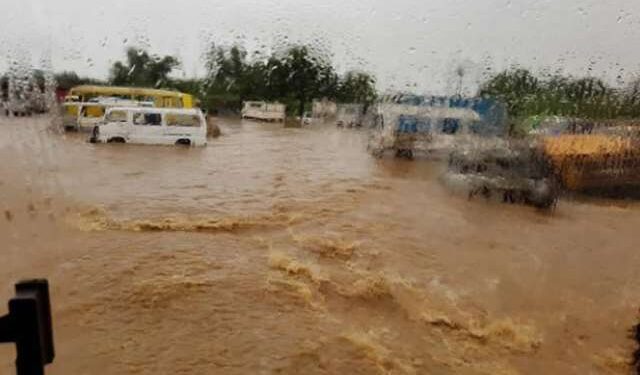The Environmental Protection Agency (EPA) has raised a red flag over the looming risk of severe flooding across major parts of the country as the rainy season nears.
The agency is calling for immediate measures to protect wetlands and prevent illegal construction on waterways to reduce the impact of expected heavy rainfall.
Professor Nana Ama Browne Klutse, the Acting CEO of the EPA, issued this warning following a powerful storm on Tuesday, March 26, which caused significant flooding in parts of the Greater Accra Region. The storm also led to fallen trees and billboards, damaging vehicles and obstructing roads.
Speaking to the media after delivering her inaugural lecture at the University of Ghana on Thursday, March 27, Professor Klutse emphasized that climate change is increasing the frequency and intensity of extreme weather events, making it imperative for the country to strengthen flood mitigation efforts.
Rising Concerns Over Extreme Weather Events
According to the EPA, the effects of climate change are becoming more evident in Ghana, with more intense storms and unpredictable rainfall patterns. Professor Klutse noted that the recent storm in Accra is just a preview of the extreme weather conditions the country may face in the coming months.
“This year, we are likely to experience a significant number of flooding incidents,” she cautioned. “The recent heavy rainfall, though brief, was accompanied by strong winds that led to destruction. These are signs that we must take immediate action.”
She urged authorities to prepare an adaptation plan to minimize damage, warning that failure to act could lead to a disastrous rainy season with devastating consequences for homes, businesses, and infrastructure.
Wetland Encroachment and Poor Drainage Exacerbate Flooding
Professor Klutse attributed a major part of Ghana’s flooding challenges to human activities, particularly the destruction of wetlands and the continued practice of building on waterways.
“No matter how heavy it rains, water should have a natural path to flow into wetlands or designated retention areas,” she explained. “When we build on these spaces, we block the natural drainage system, leading to severe flooding.”
She stressed the importance of enforcing environmental laws and urban planning policies to prevent indiscriminate construction, which worsens flood risks.
Government Urged to Take Immediate Action
The EPA is urging collaboration between government agencies, city planners, and local communities to protect wetlands and improve flood preparedness. The agency has also called for strict enforcement of environmental regulations to ensure that illegal structures on waterways are removed before the peak of the rainy season.
Beyond structural issues, the EPA is also advocating for proper waste management, as clogged drains filled with plastic waste have become a major cause of urban flooding.
Public Advised to Stay Alert
As Ghana prepares for the rainy season, the EPA is urging citizens to stay informed about weather updates, avoid building in flood-prone areas, and report illegal developments on wetlands.
With climate change making extreme weather events more common, experts warn that failure to act will lead to increased destruction and economic losses in the future.

























